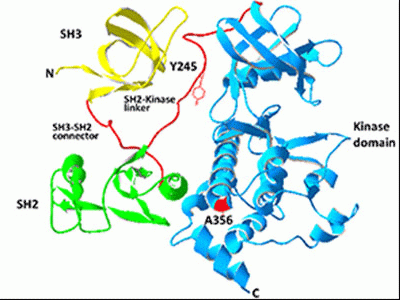Topics
Mutations in ABL1, a known leukemia gene, cause a new developmental disorder

Researchers at the Neurological Research Institute at Texas Children’s Hospital and faculty at Baylor College of Medicine have identified a novel role for ABL1, a known tumorigenic gene, in a new developmental disorder. The study was published in the journal, Nature Genetics journal and was led by Drs. Christian Schaaf, Yaping Yang and Xia Wang, faculty at the Baylor College of Medicine. Dr. Schaaf is also an investigator at the Dan and Duncan Neurological Research Institute at Texas Children’s Hospital.
The project was initiated when researchers reviewing the whole exome sequencing data for almost 70000 patients, found seven patients with similar clinical symptoms of congenital heart disease, skeletal abnormalities, joint and gastrointestinal problems, yet none of them carried mutations in any known disease-causing gene. Instead, surprisingly, all of them had mutations inABL1 gene, which had been previously implicated in causing cancer.
In cancer calls, ABL1 gene fuses with BCR gene to form the so-called Philadelphia chromosome, which is found in the blood cells of leukemia patients. This happens only in cancer cells and is not observed in normal cells. However, in this study, researchers observed ABL1 mutations in all the cells of the body.
They found that some patients had spontaneous mutations in ABL1 whereas others inherited them. In fact, one family in this study had four generations of members affected by this disorder.
Some of the patients had previously received a diagnosis of Marfan syndrome, a classic genetic syndrome that affects connective tissues and shares some clinical features with the newly identified disorder. The patients were thought to have Marfan syndrome based on certain clinical features such as skeletal abnormalities (dilation of the aortic arch that can cause aortic rupture), although none of them carried mutations in FBN1, the gene known to cause Marfan syndrome. Until this study, it was not clear what the genetic cause of their symptoms was.
This study shows the power of employing an unbiased genomics approach to identify the genetic mutations behind inexplicable clinical symptoms. The researchers acknowledge that they may never have suspected that ABL1, cancer gene would be involved in a developmental disorder, if they had undertaken a targeted approach.
Interestingly, preliminary studies showed that none of the patients carrying these ABL1 germline mutations had malignant tendencies, although the authors suggest that it may be prudent to screen newly diagnosed patients for any ABL1-associated cancers.
This study nicely illustrates how collaboration between clinical geneticists, basic researchers, and bioinformatics experts can lead to unexpected findings and accelerate the pace of discovery in an era of post-genomic medicine.





